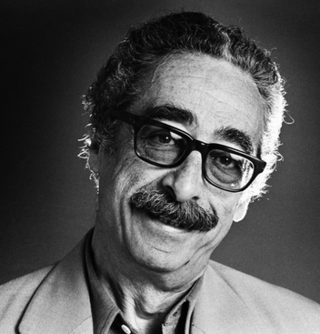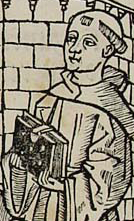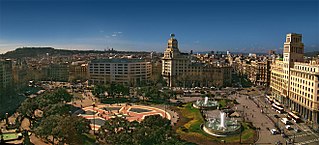Francesc Miralles Contijoch (born 27 August 1968) is a Catalan writer, essayist, translator, and musician. [1]
Francesc Miralles Contijoch (born 27 August 1968) is a Catalan writer, essayist, translator, and musician. [1]
Miralles, son of a dressmaker and an erudite office clerk, was born on 27 August 1968 in Barcelona, Spain. Having studied for eight years at a Catholic school in La Ribera, next to the Palau de la Música, he decided to continue his education by attending secondary school at the now defunct Almi Academy and at Montserrat High School.
Despite his bad high-school records he was admitted to the faculty of Journalism at the Autonomous University of Barcelona (UAB), but dropped out after four months. That year he worked as a waiter in Les Puces del Barri Gótic, a bar located on Montsió Street, where he learnt to play the piano.
The following year he returned to university, to study for a degree in English, and he worked as a language teacher in a primary school at the same time. After 5 years of apathy, at a standstill in the third year of his university course, he once again abandoned his studies.
Having been bitten by the travel bug since the age of 17, he decided to leave it all and travel the world. He lived in Croatia and Slovenia during the Balkan Wars, an experience that, years later, would be the basis for his book Cafè Balcànic (Balkan Café). He travelled to India and was inspired by the cultures and traditions in India. [2] He is influenced by Indian thinker Jiddu Krishnamurthi [2] and Ramana Maharshi. [3]
When he returned to Barcelona, he went back to university once again, this time studying for a degree in German at the University of Barcelona. After finishing his degree, he did a post-graduate course in editorial studies. His entry into the editorial world had started the previous year, as a translator of books about spirituality and alternative therapies, from German to English.
After finishing his degree, he was hired as an editor by a publishing house specialised in self-help books. There he was in charge of different collections and wrote all kind of works under a pseudonym. His thirteen months working for the publishing house were so full of incidents that they might, in some ways, be considered equivalent to the military service he hadn't done; in his first novel written in Spanish, Barcelona Blues, he recounts this experience.
After leaving the publisher, he promised himself never to work for a company again. He decided to try his luck with the young adult novel Un haiku per l'Alícia (A Haiku for Alice), for which he was awarded the 2001/02 Gran Angular prize. Since then he has been making a living mainly as a writer, but also as a literary consultant for several publishers and an agency.
Other young-adult literature he has published are El Quinto Mago (The Fifth Wizard), with a backdrop of fine magic, Alison Blix, El Cuaderno de Aroha (Aroha's Notebook), as well as Retrum, a young-adult novel that has been translated into eight languages and which is linked to his later trilogy called Øbliviøn by the presence of the Gothic-inspired urban tribe known as Los Pálidos (The Pale Beings).
In autumn 2009, he and his co-author and friend Alex Rovira received the Torrevieja Prize for the novel La última respuesta (The Last Answer), and the two have also jointly published El Laberinto de la Felicidad (The Labyrinth of Happiness), Un Corazón lleno de Estrellas (A Heart Full of Stars) and El Bosque de la Sabiduría (The Forest of Wisdom), which have been translated into more than twelve languages.
The novel El mejor lugar del mundo es aquí mismo (The Best Place in the World is Right Here) (2008), co-authored by Care Santos, has been translated into a similar number of languages.
Among the adult novels written by him, a highlight is Ojalá estuvieras aquí (Wish You Were Here) (2009), a melancholic story full of love and mystery. This novel tells of Miralles's experiences in a band called Hotel Guru, and it is redolent of the artistic atmosphere of l'Astorbari, a bar in the Barcelona district of Gràcia where live concerts are performed .
Wabi-Sabi, a story about the beauty of imperfection and the ephemeral, will appear this coming spring; it is the long-awaited sequel to Amor en minúscula (Love in Lower-Case Letters), which has already been translated into twenty languages.
Since 2012, he has been working on the novel La luz de Alejandría (The Light of Alexandria), which he is writing together with Álex Rovira.
As a musician, he released the album Hotel Guru, in 2007.
After a break with his band Nikosia, which has released four albums, he currently dedicates his time to both literature and journalism, combining monthly contributions to newspapers and magazines like El País Semanal and Mente Sana with his work as a literary pathfinder.
In addition to having written a number of self-help books, Miralles is a prolific novelist; his literary works include
His non-fiction works include
As a translator, he has translated young-adult fiction by Henning Mankell, such as Viatge a la fi del món (Journey to the End of the World) and El noi que dormia a la neu (The Boy who Slept in the Snow), both of them in 2007, into Catalan.

Carlos Ruiz Zafón was a Spanish novelist known for his 2001 novel La sombra del viento. The novel sold 15 million copies and was winner of numerous awards; it was included in the list of the one hundred best books in Spanish in the last twenty-five years, made in 2007 by eighty-one Latin American and Spanish writers and critics.

Olga Xirinacs Díaz is a Spanish writer and piano teacher. During her literary career, she has written poetry, drama, tales and essays. She was born in Tarragona, where she still lives and works.

Manuel de Pedrolo i Molina was a Catalan author of novels, short stories, poetry and plays. He's mostly known for his sci-fi novel Mecanoscrit del segon origen.

Francesc Eiximenis was a Franciscan Catalan writer who lived in the 14th-century Crown of Aragon. He was possibly one of the more successful medieval Catalan writers since his works were widely read, copied, published and translated. Therefore, it can be said that both in the literary and in the political sphere he had a lot of influence. Among his readers were numbered important people of his time, such as the kings of the Crown of Aragon Peter IV, John I and Martin I, the queen Maria de Luna, and the Pope of Avignon Benedict XIII.

Francesc Pujols i Morgades was a Catalan writer and philosopher.

Enrique Lucio Eugenio Gaspar y Rimbau was a Spanish diplomat and writer, who wrote many plays (zarzuelas), and one of the first novels involving time travel with a time machine, El anacronópete.

Manuel Mujica Lainez was an Argentine novelist, essayist, translator and art critic.

Plaça de Catalunya is a large square in central Barcelona that is generally considered to be both its city centre and the place where the old city and the 19th century-built Eixample meet.

Father Antoni Maria Alcover i Sureda, also known as Mossèn Alcover was a modernist Majorcan writer, who wrote on a wide range of subjects including the Catholic Church, folklore and linguistics. He is chiefly associated with efforts to revive interest in the Catalan language and its dialects. Among his works was a Catalan-Valencian-Balearic dictionary.
The Premio de Novela Ciudad de Torrevieja was a Spanish literary prize, awarded since 2001 by the publisher Plaza & Janés to an original unpublished novel written in Spanish (Castilian). It was created in 2001 by Ayuntamiento de Torrevieja and the Spanish publisher Plaza & Janés, intended to bring local and international prestige to the seaside town from where it takes its name.
Ikigai is a Japanese concept referring to something that gives a person a sense of purpose, a reason for living.

Eduardo Mendoza Garriga is a Spanish novelist.
Hilario Barrero is a Spanish writer, translator, professor and poet. He also is a columnist with Fifth Column in The New York Times.

La Bien Querida is the stage name Ana Fernández-Villaverde used to develop her musical career. A painter by trade, she decided to initiate in 2007 her trajectory into the music world, motivated by the frontman of Los Planetas.

Bonaventura Gassol i Rovira, known as Ventura Gassol, was a Catalan poet, playwright and politician. A nationalist, he was prominent member of the Esquerra Republicana de Catalunya.
The architecture of Barcelona has undergone a parallel evolution alongside Catalan and Spanish architecture, reflecting the diverse trends found in the history of Western architecture. Throughout its historical development, Barcelona has been influenced by numerous cultures and civilizations, each contributing their artistic concepts and leaving a lasting legacy. The city's architectural heritage can be traced back to its earliest inhabitants, the Iberian settlers, followed by the Romans, Visigoths, and a brief Islamic period. In the Middle Ages, Catalan art, language, and culture flourished, with the Romanesque and Gothic periods particularly fostering artistic growth in the region.

The Labyrinth of the Spirits is a fiction novel by Spanish author Carlos Ruiz Zafón. This is the fourth and final book in the Cemetery of Forgotten Books series. The novel was initially released on 17 November 2016 in Spain and Latin America by Planeta Group. HarperCollins published the English translation by Lucia Graves on September 18, 2018. The book was translated into more than 36 languages.

Francesc Serés Guillén is a Catalan-language writer.

Francesc Fontbona de Vallescar is a Catalan art historian, writer, exhibition curator and specialist in Romanticism, Catalan Modernism and Noucentisme Arts. Fontbona is the author of many works of Catalan art history. Doctorate in Early modern period from the Universitat de Barcelona in 1987. He was director of Graphic section in National Library of Catalonia (1995-2013), and Chief executive-writer of art section in the Great Catalan Encyclopedia (1968–78). Francesc Fontbona is member of the Royal Catalan Academy of Fine Arts of Saint George, member of The Hispanic Society of America, member of the Institut d’Estudis Catalans and Board chair of the Institut Amatller d'Art Hispànic.

Joan Perucho Gutiérrez was a Spanish novelist, poet and art critic, an activity that alternated with his profession as a judge. His work, written in Catalan and Spanish mix with other traditional elements of avant-garde and science fiction that endow great originality. Natural Stories is his best known work.